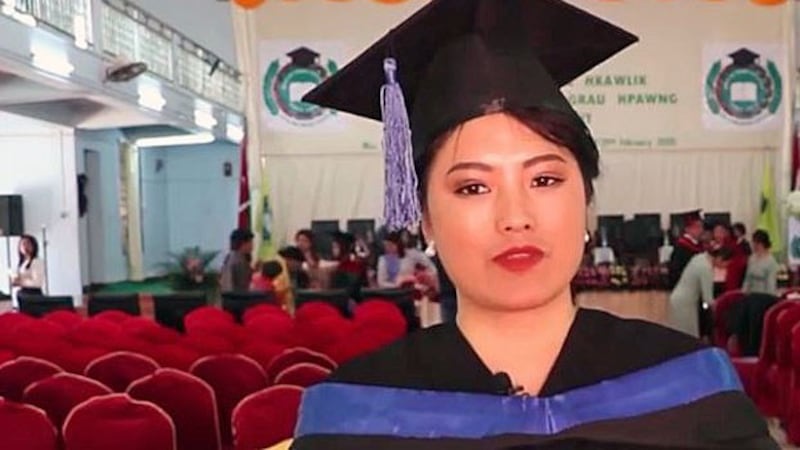High school graduates in northern Myanmar’s Kachin state saw their prospects for higher education and good jobs disappear when armed conflict between government forces and a rebel ethnic army resumed about nine years ago.
Seeking autonomy for the northernmost state on Myanmar’s borders with China and India, Kachin insurgents had fought government forces since 1961 in one of the country’s multiple, long-running military conflicts that have retarded economic and political development.
A bilateral cease-fire between the warring sides in 1994 ended large-scale fighting and provided a semblance of normality for ordinary people in the conflict zone. Kachin leaders even struck a deal with the central government to let Kachin students attend government-run universities.
But fighting resumed in June 2011 when Myanmar soldiers broke the 17-year-old truce by attacking Kachin Independence Army (KIA) troops, with hostilities spilling over into neighboring northern Shan state. Thousands of civilian died, and more than 100,000 were displaced.
The resumption of fighting also meant a breakdown of the agreement between the government and the KIA’s political wing, the Kachin Independence Organization (KIO), which allowed ethnic Kachin high school graduates to attend government-run colleges.
“For 17 years, those who passed the ninth standard in the KIO’s secondary high schools were allowed to take the tenth standard examination in a government school, and if they passed that, they could attend university,” said Yaw Saung, spokesman for the KIO’s Central Education Department in the remote mountainous town of Laiza.
“But beginning in 2010 and 2011, there was no longer any contact between us [and government authorities] with regard to education,” he said.
As a result, nearly 1,000 students who had passed their matriculation exams were not able to go to college in the years that followed renewed fighting.
“They passed the time remaining in their own regions and running around while avoiding the war,” said local educator Lu Lu Aung. “They didn’t have the chance to continue their education.”
‘Students who excel’
In response, the KIO decided to set up its own institution of higher learning for ethnic students. It opened Mai Ja Yang National College in Mai Ja Yang, a border town in KIO-controlled territory that abuts China, in September 2015.
The university offers degree programs in computer science, environmental conservation, business management, agriculture, nursing, law, English, and political science with courses taught in the local language Jinghpaw as well as in English and Chinese.
The school hires ethnic Kachin nationals who have at least a master’s degree from schools inside Myanmar or from universities abroad to teach the courses.
“The KIO knew about this situation and made sure to open this school,” said Lu Lu Aung, now the college's dean.
“The subjects are appropriate to our region and also necessary for our region,” she said. “Therefore, the students will get information on these subjects. And we will teach them so that we produce students who excel in these subjects.”
Kachin students say the subjects and the three languages in which they are taught make Mai Ja Yang National College a more attractive alternative to government-run schools in other parts of Myanmar.
“We were able to learn skills that we can put to practical use outside — skills that are really good, skills that are at a world level,” said graduate Bauk Pan.
“We also learned about our own people,” she said. “Because of these strengths, I attended this school.”

Degree not recognized
But graduates also say they are now concerned about finding suitable jobs because their academic degrees are not recognized by the Myanmar government.
“Because it is not a school legally recognized by the government, I have questions about the extent to which [my degree] will be useful in Myanmar and whether it will be accepted,” said law student graduate Saing Nu Pan.
She and Bauk Pan were among the 82 graduating students that participated in the college’s first commencement ceremony on Feb. 29.
They and their classmates had passed their college matriculation exams while attending government-run and KIO-run high schools.
Before the fighting between the KIA and Myanmar forces erupted anew, the KIO operated 263 schools with more than 25,000 students, according to the organization's Central Education Department.
During the hostilities about 150 schools were closed and over 10,000 students fled to town to escape the armed conflict.
Though students in primary and middle schools began taking classes in town, they were still barred from entering college because the education agreement between KIO and the government was null and void.
But the KIO has made sure that ethnic students will no longer be shut out of the higher education system, said Nay Win, Kachin state’s minister for social affairs.
“They now have the chance to attend an official school,” he said.
“It doesn’t matter which one is of a higher level and which one is of a lower level, every citizen who has officially passed the tenth standard [in secondary high school] can attend an official school opened by the state and shall have their full rights.”
Reported by Elizabeth Jangma for RFA’s Myanmar Service. Translated by Than Than Win. Written in English by Roseanne Gerin.
